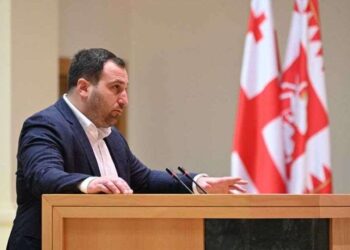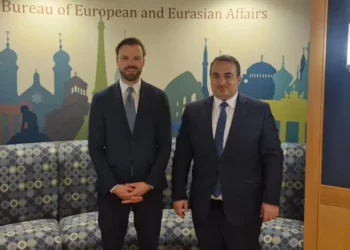“Many key supporters of President-Elect Donald Trump are the ones who are backing these pieces of legislation in Congress. There is no deep state in the US State Department that’s trying to undermine US-Georgian relations, because this is a bipartisan issue. So this is just Georgian Dream propaganda,” – says defense and security expert Luke Coffey, Senior Fellow at the Hudson Institute. Long-time Georgia-watcher, Coffey sat down with Radio Free Europe/RL’s Georgian Service to answer our questions on the US’s recent legislative efforts, including the Megobari Act and the “Georgian Nightmare Non-Recognition Act,” as well as what we might expect from Trump’s administration with regards Georgia, once he is sworn in.
Would it be fair to say that we’ve reached a point where US-Georgia relations are at their lowest since Georgia gained independence?
Absolutely, yes, we are at that point. But I’m an optimist, and I like to look at these relationships in the longer term. I’m confident we can get this relationship back on track if both sides pursue the correct policies.
Do you expect the Georgian Dream (GD) government to cooperate with you in that regard?
No, I have low expectations for the Georgian Dream government to do this. I think the best case scenario is that the Georgian Dream government will offer some concessions to the legitimate political opposition and to civil society that can restore trust inside of Georgia, and then maybe in the longer term, when there is a democratic change of government, then we can get the US-Georgian relationship back on track.
What would those concessions look like?
Well, at this point, it’s difficult to see any of these concessions happening. Right now, Georgian Dream seems very confident in what they’re doing, mainly because they’ve had such a weak response from the West, and in particular from Washington. But I think the most reasonable and best course of action for the Georgian Dream government would be to acknowledge that there have been some mistakes, acknowledge that the Russian law probably wasn’t the best piece of legislation to suit Georgian society, and then call for new elections. But I’m not confident that they will do this. As an American, of course, I’m always optimistic about these matters, but I do realize that the situation on the ground points toward a very difficult situation going forward, not only for Georgia and the Georgian people, but also for the US-Georgian relationship.
You mentioned weakness from Washington. Can you elaborate on that? What could have been done and was not?
In many ways, it was similar to Biden’s approach to Ukraine. It was always to do just enough to make it look like something is being done, but never do enough to be decisive, and never do enough on time. For example, when it comes to the sanctions that the US had to put on certain officials in Georgia, or the travel bans or even the public statements, they have always come too little too late, so they haven’t been able to have a meaningful impact on the situation.
The Megobari Act was reintroduced in Congress last week, then this week we got the bipartisan “Georgian Nightmare Non-Recognition Act.” If enforced, the latter would effectively mean the US does not recognize the GD government. What happens if that becomes a reality?
Well, I recently wrote that I think we should downgrade our diplomatic representation in Georgia. I think we should reduce it to chargé d’affaires. For too long, the Georgian Dream government has openly criticized US ambassadors, and there have been no consequences. But, in practical terms, if we don’t recognize Georgian Dream as being the legitimate government, that means America’s attention, focus, and resources need to be on those who we think are legitimate, and that is the Georgian people. We have seen a similar situation in Belarus, where the US has focused on civil society organizations, non-governmental organizations, legitimate political opposition groups, and we’ve supported them in Warsaw, in Vilnius. We have to get creative on how we do this.
What message does downgrading diplomatic representation convey? “GD offends our ambassadors, so we’ll not have an ambassador at all, so that they cannot offend them”? Does that send a message of strength, do you think?
Well, it sends a message that the US doesn’t recognize the government as being legitimate; that it’s not important enough to warrant an ambassador. And, let’s be honest, it’s not as if US ambassadors in Georgia in recent years have been all that effective. So in practical terms, I’m not sure what it would actually change on the ground, but on geostrategic terms, I think it would send the right message.
And yet, it would give the ruling party a platform to spin their narrative on: “We scared the US away. Look how strong we are!”
Yes, I know they will spin this for propaganda reasons, or they will say that the ambassador was so weak, they were called back to Washington. But the truth is, for too long, the US ambassador has been disrespected, slighted, offended by Georgian Dream officials. And it was mainly because of the weakness of the Biden administration that it was allowed to happen. The way Georgian Dream officials were speaking about US ambassadors was not how a US partner should talk about an American ambassador. And I think the Georgian Dream officials should understand that this is not going to be tolerated under Donald Trump. I mean, this is a guy who is talking about annexing Canada, okay? Do you think for a second that he is going to tolerate any level of disrespect to an individual that he might appoint to be ambassador to Georgia? Of course not.
Why then, instead of downgrading, not appoint someone who would be forthright and give it back as good as they get?
Yeah, possibly. That could happen. It would be a good approach. My [Hudson Institute] paper, where I suggested the downgrading, was focused on the Biden administration, knowing that when January 20th comes around, there’s going to be a clean slate, a new beginning. President Trump can reassess the situation and decide if an ambassador is warranted, but I haven’t heard any speculation on if the ambassador will be replaced or by whom. Honestly, I don’t think it’s being discussed.
The Belarus-like scenario you mentioned is not exactly enticing for Georgia, as, despite all the energy and funds the US has spent on the Belarusian opposition and civil society, Lukashenko still reigns supreme. Not exactly a desirable outcome, is it?
No, it’s not desirable for the Georgian people at all. If I was a Georgian, I would not want to have a Belarus in the Caucasus. But the sad truth is, this is the way it’s going. Look at the crackdown on civil society. Slowly but surely, this is the way Georgian Dream is taking Georgia.
Are there any lessons from Belarus’ experience that the West, and particularly the US, has learned and can now employ in relation to Georgia?
To be decisive and not to dither, and not to base your policy on hope, but instead base it on action and try to develop and engineer an outcome that suits the interests of the United States, but first and foremost of the Georgian people. If the Georgian people wanted to get into Russia’s orbit, that’s their business, but you can see on the streets that this is not the case. And therefore, I think it’s in America’s interest to support the Georgian people through this very difficult time.
According to the abovementioned bill, the US would recognize Salome Zurabishvili as the only legitimate leader in Georgia. Does this effectively turn her into a sort of Tsikhanouskaya at home, even though she has explicitly said she doesn’t wish to play such a role?
Well, I think we have to take a step back and understand how US foreign policy is made. Congress sets the parameters, establishes the terms, and then they require the executive branch to act on them. The executive branch has a lot of leeway on how they interpret the legislation, and on how they want to implement it. The “Georgian Nightmare Non-Recognition Act” will, as it’s written in the latest drafts I’ve seen, do exactly as you just outlined. But how this translates into US policy might be a different story.
Onto the Megobari Act. On what basis would Georgia’s eventual return to that democratic path be judged? Would Georgian Dream’s removal be enough to automatically secure something like visa-free travel in the US?
Well, it depends on the circumstances in which they are removed. The best course of action is for Georgian Dream to be removed within the existing legal constitutional framework. But, ultimately, this is a matter for the Georgian people to decide. I’m always very careful on this issue, because the propagandists will say that “Luke Coffey is organizing the next color revolution.”
Or that you are a leading member of the Global War Party.
Yes, which is complete nonsense. So, ultimately, this is a matter for the Georgian people. If Georgian Dream is over, then, of course, we can start the process of getting that relationship back on track.
The “Global War Party” and “Deep State” are cornerstones of GD’s narrative. This week they accused Rep. Joe Wilson of being the embodiment of “Deep State.” Is this the same “Deep State” that President-elect Trump repeatedly mentioned in his pre-election speeches?
No, not at all. This is just Georgian Dream trying to use misinformation, propaganda, to get in good favor with President-Elect Donald Trump. And the reality is, Donald Trump is not going to enter office and automatically side with the Georgian Dream principles, ideas or movement. Many key supporters of Donald Trump are the ones who are backing these pieces of legislation in Congress. There is no “deep state” that’s trying to undermine US-Georgian relations – this is just Georgian dream propaganda
They also claim the West is trying to force Georgia into opening a second front. Looking at things from a purely realpolitik perspective, what would the West gain by opening a second front against Russia in Georgia?
Nothing to be gained at all. And that is why I’ve never heard any think tanker, policymaker, lawmaker, commentator in America suggest this. This is another complete fabrication made up by Georgian Dream officials to scare the Georgian public. They used this talking point very effectively leading up to the elections, and, sadly, the political opposition didn’t make any meaningful effort to counter the argument.
You can barely manage one front in Ukraine, so why would you want another that you were bound to lose in two or three days?
Exactly. Exactly. It’s just doesn’t make sense. And that’s because it’s not true.
Interview by Vazha Tavberidze














